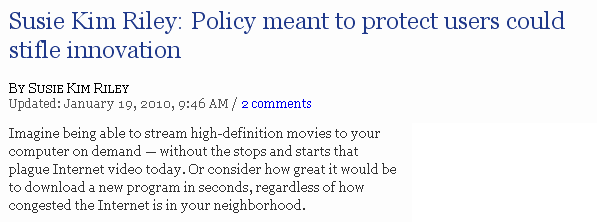It is becoming more important than ever to break out Google when you find anti-consumer rhetoric in your local newspaper or online regarding Net Neutrality. Too often, newspapers, local broadcast media, and online news sources don’t bother to fully inform their readers or viewers about inherent conflicts of interest found in those advocating opposition to Net Neutrality.
Case in point, a commentary in The Buffalo News titled “Policy meant to protect users could stifle innovation.” The only thing Net Neutrality threatens to stifle is the author’s paycheck.
The writer, Susie Kim Riley, paints a Net Neutral-world of grainy online video, no more “lite” plans for those who only need to use the net to send and receive e-mail, uneven downloads, and bans on video conferencing for small businesses introducing new products.
Shame on you, dear readers, for wanting a free and open Internet without your provider interfering with your service to enhance their bottom line.
Remarkably, this blizzard of bull didn’t just turn up in the Buffalo newspaper. Riley’s scaremongering also turned up nearly word for word in The Detroit News. Apparently newspapers are hard-pressed to publish the views of local residents and are now regurgitating mass-mailed opinion pieces written in other states.
Most anti-Net Neutrality drivel shares common themes which we like to call industry talking points. Their overall theme: the nasty government, without cause, wants to overregulate the Internet to tie the hands of innocent providers who seek better products for their customers.
Stop the Cap! readers have had plenty of experience with helpful providers who bring these appetizers to the table:
- Internet Overcharging schemes that claim “fair pricing” through usage caps and tiered billing, but in fact cost everyone more;
- Throttled broadband speeds, often causing a 90 percent or more reduction in advertised speeds for services targeted by providers;
- Schemes to monetize broadband products and services by providing “enhanced” service to those willing to pay to have their content “enhanced;”
- Exemptions from usage caps and meters for content partners;
- An unwillingness to make appropriate investments in highly profitable broadband networks, instead relying on traffic reduction schemes like caps, allowances, and high pricing to discourage “excess usage.”

Twice is Nice. The Detroit News ran the same guest editorial, nearly word for word, as The Buffalo News
Where Net Neutrality goes unprotected, providers begin rolling out Stifled Broadband. Canada, Australia, New Zealand, and several other countries endure this today. The only innovation this brings is new ways to charge consumers more money for worse service, making a handful of barely competitive providers very rich. But such wealth empires aren’t created by providers alone. Selling the equipment that fiddles with your Internet connection to throttle speeds, monetize usage, and cut off “abusers” is a growth industry as long as Net Neutrality protection is kept at bay.
That’s where Riley comes in. She is founder and chief technology officer of a company called Camiant, which bills itself a leader in “real time policy control.” Control is right. Camiant’s products and services are all about controlling your online experience. Her company sells products like “Multimedia Policy Engines,” which can artificially impede or enhance broadband traffic at the whim of your provider. Just add their “Fair Usage Management” (FUM) extension and your provider can begin spying on your usage: determining what you are doing with your broadband connection, measuring if you are a heavy user/abuser worthy of punishment, and then injecting the appropriate punishment — throttled broadband service, a bigger bill from usage penalties and fees, or even being kicked offline. Your provider has a world of arbitrary, easy to configure limits, fees, and penalties at his disposal thanks to FUM.
In short, Camiant’s bread and butter is spread by the cable and telecom industry who buys the company’s products and services. Is it any surprise Riley is opposed to Net Neutrality? Pass it and Camiant either needs to develop a new line of products or subsist on selling their schemes abroad, where such protections might not exist.
Of course, newspaper readers don’t have any information about Riley’s very-vested interest in this debate. Although both papers identify Riley as “founder and chief technology officer of Camiant, a technology firm in Marlborough, Massachusetts,” calling Camiant a technology firm is about as informative as calling Hurricane Katrina a weather event. Lack of full disclosure does a great disservice to readers of both newspapers. Instead, how about “Camiant markets and sells products that may be prohibited if Net Neutrality becomes law in the United States.”


 Subscribe
Subscribe


If only we could get Jamie Hyneman and Adam Savage to tackle all the myths floated around by the industry…
It sure would be nice if authors were required to disclose any financial ties that may bias them like you often find in scientific journal articles. It’s sad how many writers have a clear, selfish purpose for what they write. And I think newspapers should require disclosure of that purpose so I am not insulted when they try to convince me that their selfish argument actually benefits me. She doesn’t explain in the article why it will make internet more expensive, nor why it will result in “a world of grainy video clips, uneven download times and fewer innovative services.”… Read more »
“Moreover, for streaming applications to work consistently, a network must treat the data stream in a discriminatory manner to ensure quality.”
From The Detroit News: http://detnews.com/article/20100120/OPINION01/1200314/Don-t-let-Net-neutrality-rules-fuzz-up-Internet-videos#ixzz0dNGYpixh
Really?!?! Must the network do that? That’s quite a statement Mrs. Chicken Little provides with no reasoning or data to back it up. I find that even on a relatively slow (3 Mbps) connection, I can stream Silverlight video with no hiccups even during peak hours.
I’m pretty sure that investing in your network to make sure it’s sufficient for the traffic required will also ensure quality of streaming data